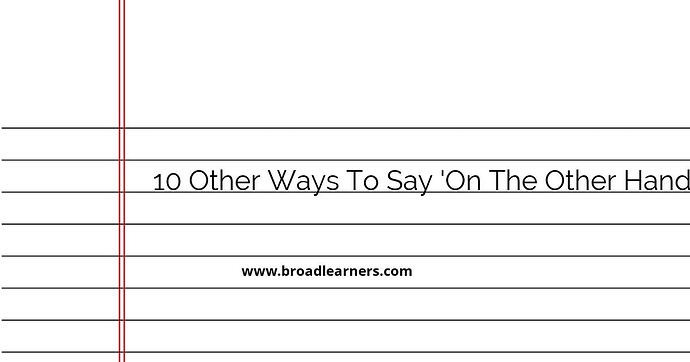When expressing contrasting or opposing ideas, the phrase 'on the other hand' is commonly used. However, if you want to add variety to your language and avoid repetition, here are 10 other ways to say 'on the other hand':
- However
- Alternatively
- In contrast
- Conversely
- On the flip side
- Nevertheless
- Yet
- In spite of that
- Nonetheless
- In any case
Let's explore each alternative in more detail:
1. However
'However' is a versatile word that can be used to introduce a contrasting or opposing idea. It is commonly used in both formal and informal writing.
Example: I wanted to go to the party. However, I had to study for my exam.
2. Alternatively
'Alternatively' suggests an alternative point of view or another option. It is often used to present a different perspective or choice.
Example: We could go to the beach. Alternatively, we could go hiking in the mountains.
3. In contrast
'In contrast' is used to highlight differences between two things or ideas. It emphasizes the distinction between opposing viewpoints.
Example: The first movie was a comedy. In contrast, the second movie was a drama.
4. Conversely
'Conversely' is used to introduce an idea that is the opposite or reverse of a previous statement. It emphasizes a contrasting viewpoint.
Example: The early bird gets the worm. Conversely, the night owl enjoys the nightlife.
5. On the flip side
'On the flip side' is a colloquial phrase that suggests an alternate perspective or viewpoint. It is often used in informal conversations.
Example: On the one hand, it would be fun to go out tonight. On the flip side, I have a lot of work to do.
6. Nevertheless
'Nevertheless' is used to introduce a contrasting idea that does not negate or contradict a previous statement. It implies an acknowledgment of the opposing viewpoint.
Example: The weather was cold. Nevertheless, we decided to go for a walk.
7. Yet
'Yet' is a versatile word that can be used to introduce a contrasting idea or to show surprise or contradiction. It can be used in both formal and informal contexts.
Example: He studied all night. Yet, he failed the test.
8. In spite of that
'In spite of that' is a phrase used to introduce a contrasting idea or situation that does not diminish the importance of the previous statement. It emphasizes resilience or persistence.
Example: She was tired. In spite of that, she continued working.
9. Nonetheless
'Nonetheless' is used to introduce a contrasting idea that does not detract from the previous statement. It suggests a concession or acknowledgement of the opposing viewpoint.
Example: The movie received mixed reviews. Nonetheless, it was a box office success.
10. In any case
'In any case' is a phrase used to introduce a contrasting idea or situation that remains true or relevant regardless of the previous statement. It implies a broader perspective or consideration.
Example: The restaurant is expensive. In any case, the food is delicious.
Did I miss anything? Respond below
